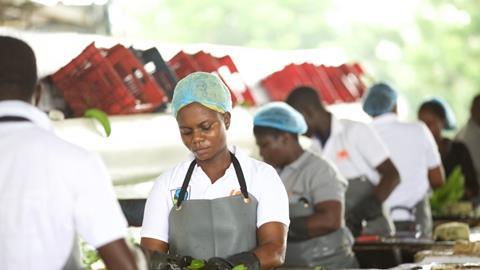Certification scheme plays key role in supporting retailers to meet their recently announced living wage commitments, according to report by Fairtrade Foundation
New research on Ghanaian and Colombian banana workers in UK retail supply chains has shown that the Fairtrade Premium plays an important role in achieving living wages.
On top of the price that Fairtrade farmers and workers are paid for their produce or labour, they receive an extra sum called the Fairtarde Premium to spend on community or business projects of their choice.
Conducted using innovative FairVoice technology via banana workers’ mobile phones, the study highlights how investments made through Fairtarde certification help close the living wage gap. This creates the enabling environment needed to make living wages effective in improving livelihoods, Fairtrade said.
The report follows the news that nine major retailers in the UK have joined forces to commit to a living wage for banana workers in their international supply chains.
Aldi, Asda, Co-op, Lidl GB, Marks and Spencer, Morrisons, Sainsbury’s, Tesco, and Waitrose, supported by the sustainable trade initiative IDH, are working with a collective goal to close the living wage gap within their banana supply chains by the end of 2027.
The initiative complements similar agreements in Belgiium, the Netherlands and Germany.
The research by Fairtrade found that in Ghana the Fairtrade Premium reduces the pressure on wages since it is used to subsidise food in cafeterias, build schools and health centres, provide transport, and enable access to interest-free loans, equating to a cash equivalent of $75 per worker per month.
The living wage benchmark for the region is $257 per month and 66 per cent of workers reported that they used cash payments to fund basic needs such as food or running costs.
Meanwhile, in Colombia where the living wage benchmark is $455, banana workers receive additional benefits that are equal to $88.60 per worker per month.
“The need for a living wage has always been pressing in the banana sector because workers are among the most vulnerable people in global trade,” the Fairtrade Foundation said.
“Without access to land or unable to make a living from it, they have few options for a sustainable livelihood. These workers often lack formal contracts, freedom of association, basic health and safety assurances, and adequate wages, among other challenges.”
Global economic uncertainty over the last two years has increased the need for producers to be able to earn sustainable livelihoods, and as the UK has among the highest per capita consumption of bananas in Europe, importing on average more than a million tonnes a year, Fairtrade believes that the UK banana industry has a big opportunity to drive change in the sector, at scale.
Anna Mann, head of responsible business at the Fairtrade Foundation, said: “Certification schemes, like Fairtrade, can play a key role in supporting retailers to meet their living wage commitments. Data shows that sourcing on Fairtrade terms is a significant step towards achieving living wages for workers, especially for retailers sourcing 100 per cent of their bananas from Fairtrade.
“As some retailers commit to price interventions in their supply chain to address the gap, and others map wages in their supply chains, it has become increasingly important to understand how investments made through certifications like Fairtrade support the closing of the gap and make wages more meaningful.”
Fairtrade sourcing provides workers with a bundle of interventions through the Fairtrade Premium and Fairtrade Minimum Price, ensuring plantations can maintain the costs of production, including wages, during commodity price crashes.
In July 2021, Fairtrade launched the Fairtrade Base Wage for banana plantations. It is set at 70 percent of the take-home pay needed for a living wage, and 30-50 per cent of the Fairtrade Premium can be paid out as cash for workers.
For bananas coming from estates, the Fairtrade Premium is $1 (€0.96) per 18.1kg box of fresh bananas and is paid to the Hired Labour Organisations (HLOs). Each HLO has a Fairtrade Premium Committee that decides together with its workers how the money is spent




